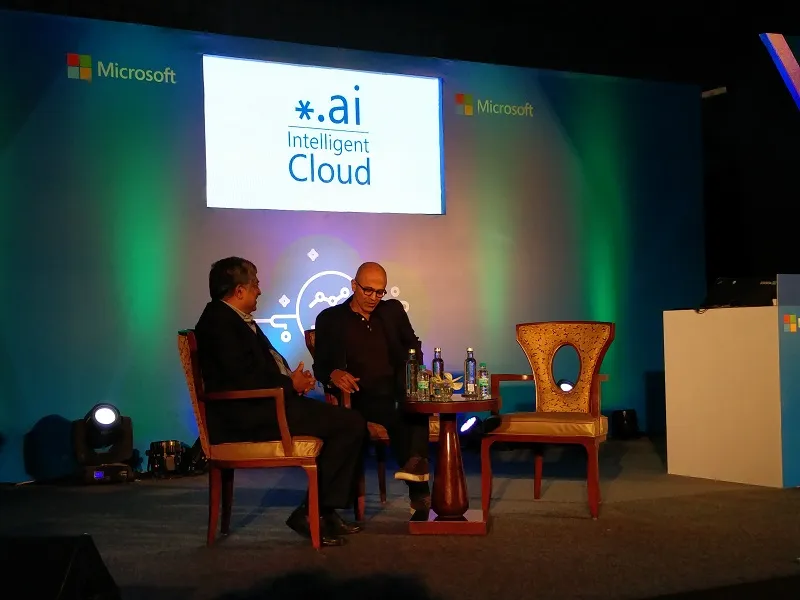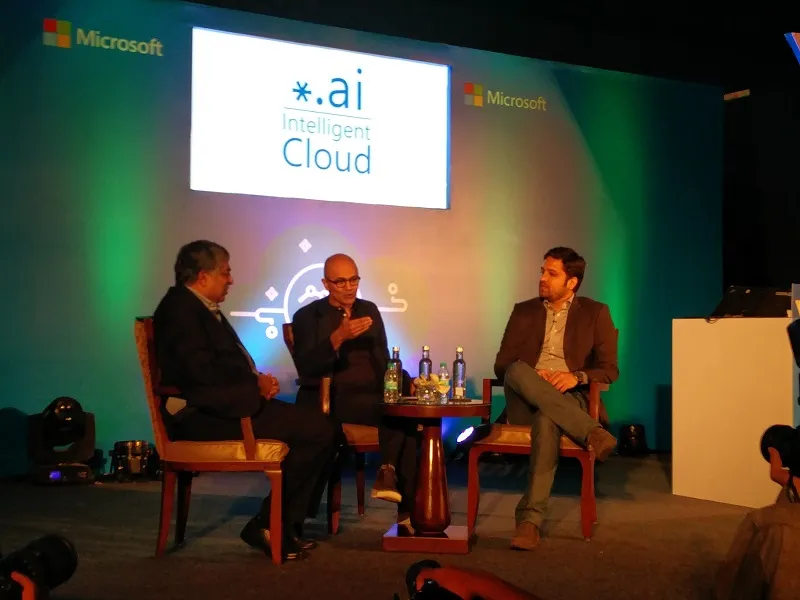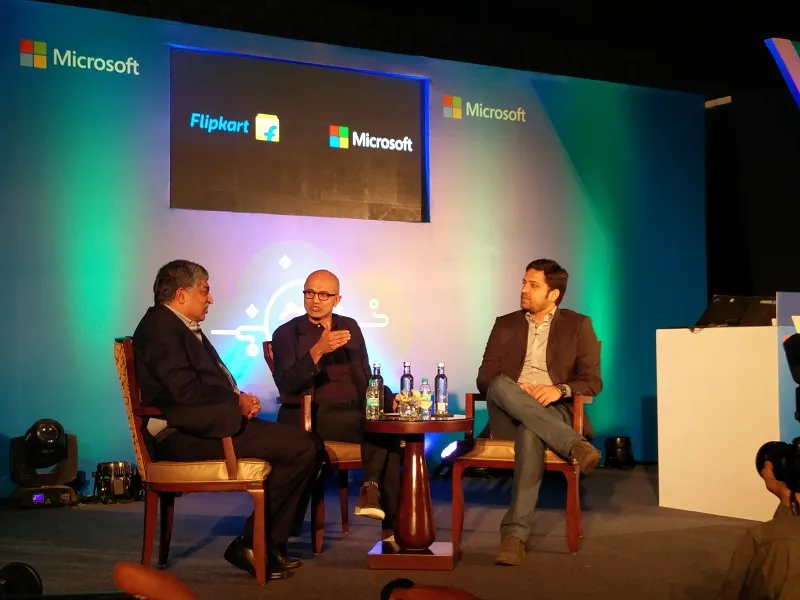The centre of entrepreneurial energy for us is all around cloud: Satya Nadella
"Every time I come back to India, the thing that grabs you is the entrepreneurial spirit of the place. I’ve met a whole bunch of startups doing really exciting work," remarked Microsoft CEO Satya Nadella as he took the stage with Nandan Nilekani, co-founder of Infosys and chairperson and co-founder of EkStep Foundation at an event in Bengaluru.
Here are some of the highlights from the session that also included a special guest and announcement at the end.

Starting up again in 2017
Referring to Nilekani’s work with Aadhaar, Infosys, and other projects, Nadella noted that he personified the need for the country to create more products. Nadella then asked, "If you were starting up again today, what would you do now?" Nilekani joked, "Very excited by what is happening now. Wish I was 30 years younger."
Nilekani went on to say that there is a lot more power for startups now to disrupt existing industries or create new ones. A key takeaway of his Aadhaar experience was that while building new technologies, startups and enterprises have two choices:
Build something in-depth that has a lot of impact on 50 million people, or do something less in-depth that has an impact on one billion people.
Nilekani noted that there were a lot of interesting developments in the field of AI, with the power and capabilities it has to offer. Talking about Aadhaar, Nilekani said that he and his team were inspired by the widespread adoption of internet and APIs. Both technologies were able to hit a billion people quite quickly.
"Microsoft is a platform company"
Extolling Microsoft for its experience in developing a suite of products like Office 365 and others, Nilekani asked, "So what platforms is Nadella excited about now?"
Nadella answered, “We fundamentally think of ourselves as a platform company.”
He said that Microsoft is focusing on multiple areas ranging from artificial intelligence to natural language processing and even augmented reality, with their latest product Hololens. Nadella also considers Cortana, Microsoft's virtual assistant, to be a ‘third run time’. He explained that a device’s operating system was the first run time, browsers were the second run time, and now agents like Cortana which understand and know your work are third run times. Nadella noted,
"But the ultimate test going forward will be in really understanding natural language. For all the advantages in human computer interface, there is nothing to beat language. That is the ultimate test.”
Talking about how new-age learning tools can impact different sectors from education to healthcare, Nadella said,
I'm an electrical engineer who never understood Maxwell’s equations… I’ve thought if there were better learning tools……
Nilekani interrupted Nadella’s train of thought here and quipped,
Then you would not have ended up at Microsoft!
Benefits of building at scale
Nilekani observed that unless one is building technology at scale, it is difficult to see the real benefits. Aadhaar crossed a user base of one billion in about six years and the only other players who can claim such a feat are in Silicon Valley and Seattle.
Nilekani also noted that a well-built system at scale can decrease the cost and time involved in customer acquisition and cited the example of how Reliance Jio went about doing their KYC through Aadhaar. The government benefits too as it can better identify people and also save manpower and time in the long run. He said,
"Data can be a source of individual empowerment. But for that, one needs necessary architecture. If all these technologies can be used for empowerment it will be great. In the West, there is a fear that AI will come out on top. Hence there is some pushback."
Agreeing with Nilekani, Nadella added, “Data is the new natural resource that is unevenly spread.”
Talking about network effects and its benefits, Nadella said that whatever one is building as a platform should function as a resource for someone else building a platform too. For example, if someone wanted to sign up for Microsoft’s services like Office 365, providing them an Aadhaar-enabled login would speed up the process.
Leveraging the power of ML, AI, and cloud
Just five days ago, Microsoft had also announced that it aims to combine the cloud, AI, research, and its industry expertise to transform healthcare with its Healthcare NExT initiative, in collaboration with UPMC (University of Pittsburgh Medical Center).
Nadella and Nilekani agreed that providing reliable cloud infrastructure is important. Any startup that wants to build on the India Stack or for other large projects will have the necessary infrastructure in place. Nadella cited the example of how the government in Andhra Pradesh leveraged machine learning (ML) to detect dropouts and help bring them back to school. Similar strategies are now spreading to Jharkhand and Punjab.
Talking about the enlightened use of infrastructure, Nadella also noted that the election commission of Tamil Nadu leveraged Microsoft’s public cloud, Azure. In the past, one would build all the servers, but in this case, Tamil Nadu was able to quickly ‘hydrate’ and ‘dehydrate’ their servers leveraging cloud computing services.
Role of government and private sectors
Talking about issues like public-private partnership and the privacy of data, Nadella asked Nilekani about the different roles at play here. Nilekani noted that the important question here was,
What is government infrastructure and where does it end and where does private innovation start?
Nilekani noted that the Aadhaar Bill is being passed which includes all the necessary frameworks, policies, and also a privacy criterion. Given the financial strength and other factors, Nilekani remarked, “The government is best suited to build such infrastructure. They will obviously keep privacy in mind.”
There is then the need to create a level playing field so that enterprises small and big can leverage the existing infrastructure.
Importance of minimalism
Nilekani noted that minimalism is an important concept when building platforms for scale. Private companies can’t build it in the same way as the government as they need to add an extra layer to earn revenue. Government bodies, though, could build without having those concerns, for the short term. The goal should be to build a solution that can be hard coded and spread quickly. Sharing one example, Nilekani said,
"We had only four data fields in Aadhaar. Somebody else who had 22 fields claimed to be superior and questioned us as to what kind of Mickey Mouse stuff we were building. But to work at scale, minimalism is needed for mass adoption."
Indian startup ecosystem and the cloud
Talking about the Indian startup ecosystem, Nadella observed that the Indian market was huge and he was encouraged by both the small startups and the bigger ones that were innovating and adopting the cloud. He noted,
"Great to come to India and see convoluted neural nets being used to solve problems."
Having interacted with many startups and seeing more than 2,000 of them leverage Microsoft’s cloud services, he found the entrepreneurial energy remarkable. He said he was also encouraged by how Indian startups were able to raise funding from local and international funds and also enthused by the startups he met at Microsoft’s own accelerator.
Microsoft and Flipkart’s cloud partnership

Nadella then introduced Binny Bansal, Flipkart Group CEO, and said,
"We started with Nandan Nilekani who brought the first wave of the Indian startups. Now I want to end our session by introducing another entrepreneur who got the second wave of Indian startups started — Binny Bansal from Flipkart."
Binny said that with Flipkart about to complete 10 years of its existence, they are happy to have taken e-commerce to the first 50 million customers in the country. Bansal noted, “As we think about the next 10 years, the question is: how do you scale this number to 10x? Delighted to partner with Microsoft. With our combined strength and understanding of the e-commerce market, we can reach higher.”
Leveraging AI for a better experience: Going forward, Bansal aims to leverage their in-house capabilities with Microsoft's AI strength to better recommend the right products to their e-commerce customers. He sees a big opportunity for this in the fashion segment for Myntra.
Related read: Microsoft forges cloud partnership with Flipkart to take on Amazon’s AWS
Bansal also noted,
Technology is a great leveller: Today someone sitting in a remote part of India can access a lakh of products. The same variety of products is also available to someone in a big city. This wasn't possible 10 years ago.... The opportunities are limitless… As Nandan once famously said, ‘The world is flat… I believe that technology is the bulldozer’.
The future of AI

Talking about AI, Nadella said that he sees the sector bringing down costs and making industries like eye care and education more widespread and affordable.According to him, though, the most exciting thing in the last five years has been the specialised branch of deep neural networks that are fundamentally giving us human perception. He said,
We won’t go back to the AI winter as long we don't overhype it and work on real-world applications. But we need to be mindful of the impact of AI on jobs. That is why LinkedIn and LinkedIn learning are working to help people who have to change professions or get mid-skilled jobs.
Nadella and Nilekani agreed that the classical way to fix the job issue was to have more hospitals for more doctors, etc., but the only way to deliver this in a realistic timeline is by leveraging AI as a strategic tool to provide personalised health, education, and financial services, etc. Nilekani noted,
Predicting the skills needed for mid-level jobs in the future won't be easy. To better prepare people, we will need to help them get life-long learning skills.







